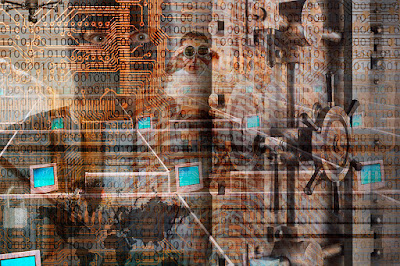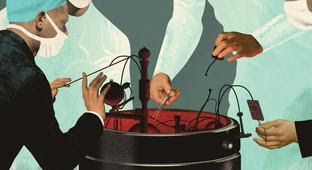There's a contrast to be made between two expressions of the Info Sphere recently that ought to give one a moment to pause and consider what the factory mindset of Capitalism, now mutating ever faster under the pressures of electrified competition, does to the dichotomy between work and making things, and the tools we use to make either happen.
On the one hand is the making of a wallet, and on the other the making of a home. Both processes involve an ostensibly practical output, and both could provide an equal possibility for either great personal involvement with the tools and crafting, or great disconnection, as with the cursory involvement of a machine applying motive force, and interchangeable attachments providing, cuts, blows, transfers and placements.
As anyone who has spent any time at all looking into can tell you, working with wood, or working with leather can provide ample opportunity for a true craftsman to show off what a connection to one's tools can yield. And it matters only in small part whether one is putting together large assemblies of wood or leather (as in a house, or involved leather apparel), or smaller ones (as in a wallet or a cabinet), that connection will still be quite apparent.
So we now come, first, to the video of a leather craftsman making a wallet, and it is a beautiful thing to behold; not only because the end product is aesthetically desirable, but because one can see the deep involvement of the craftsman as he works. And the thing is, you could change this example to a master custom car builder, making a one of kind vehicle creation, and you'd get much the same involvement. The tempo, the different cadences of the tools used, and the different tactility of the materials used, would provide a completely different feeling certainly, but deep involvement would be the same.
Contrast this with the commercialized modality of building a home now. Standardized methodologies of cutting, placing, and fixing in place make for a process that excels in efficiency; so much so that, more and more, homes now can either be manufactured modulary in a factory, with a great deal of machine, and assembly line, applications, printed outright now on sight, or still built by hand, but with only the most cursory skill sets required (at least for the major part of the framing).
I mention this because an article today from nbcnews.com indicates that a now hot housing market has suddenly found itself short of carpentry workers. Not surprising as the last fall off of market demand left former workers scrambling to find other vocations. The thing is, the expectation here is that workers, who used to do who knows what kinds of various things that are now not so marketable, ought to be flocking to this new demand opportunity. The assumption being that training of one sort or another would be provided, though it is not always clear who will be expected to pay for that training. And low and behold, the unemployed are now gainfully set, even if $16 or so an hour might be a pretty big come down in wages.
Of course the real problem with this is that the workers moved over will be fine only so long as the hot market lasts, or an assembly method is found to do their skill more cost effectively. But hey, no big problem, right? We can just have them shuck off that last bit of cursory tool connection and form a new set of same with some other temporary skill requirement.
And as time progresses, and competition increases, this process can only be seen to cycle around ever more rapidly. The question then needs to be asked: Is there an intrinsic part of the human psyche that needs a deep, and lasting, connection with tools of one form or another, and the kinds of involvement that goes along with them? And if there is that need, what do we do to ourselves when we thwart it ever more severely?
Think about this. Think about it carefully because it matters greatly as just one of the aspects of what is making us all increasingly insane right now
The music is a tad cheesy and occasionally it all feels a bit self-aggrandizing but, goddamn, is it relaxing.
See Also:
See Also:
A new federal program signed up hordes of eager students — just as the industry went bust.
.














![[No Caption]](https://www.quantamagazine.org/wp-content/uploads/2016/04/Hoffman_1K.jpg)









